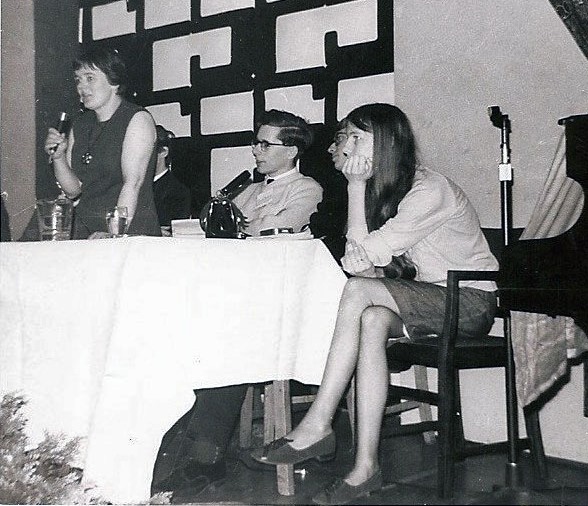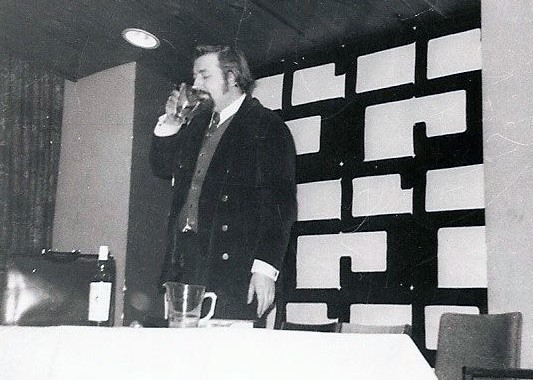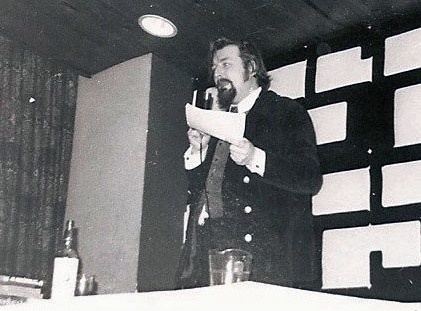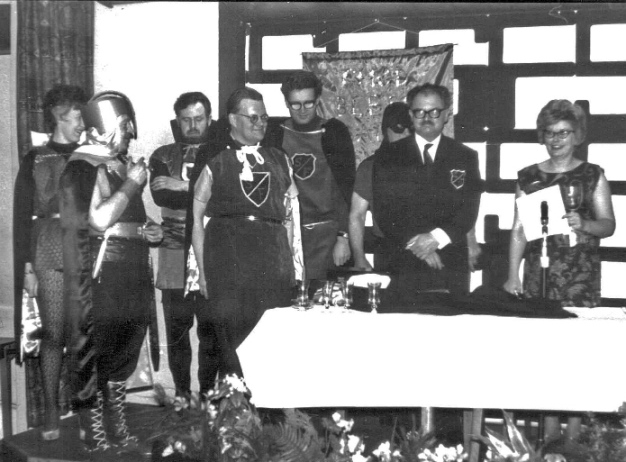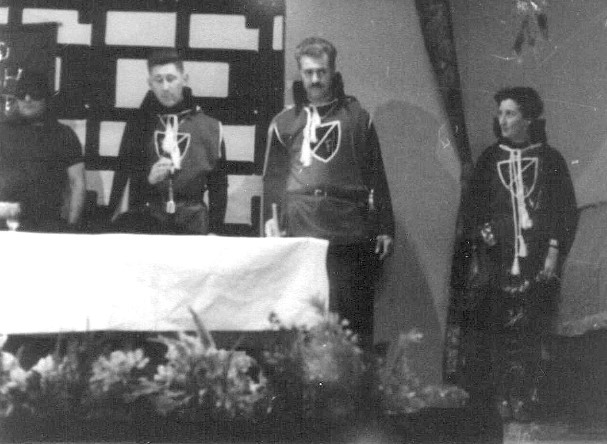Sunday 26th MarchDAV GARNETT:Somehow get back to room, because wake up there Sunday a.m. in time for breakfast. To save money, check out of hotel and take room in nearby bed and breakfast, which costs 12/6. MERVYN BARRETT: Wearing yesterday's clothes and an ill fitting pair of eyeballs I arrived in the dining room where, not feeling fantastically brilliant, I just sort of stood hoping that someone might take me in hand and see that I was properly fed. Brian Aldiss and wife were there breakfasting and seeing in a flash that I was incapable of making any decisions for myself they graciously invited me to their table. PETER WESTON: Most people attended the Sunday morning session of the annual general meeting of the British Science Fiction Association. It was here that I very nearly became involved with organising a future convention. I had been talking through the weekend with other local fans about the possibility of holding a convention in the Birmingham area in 1969 then, while eating a quiet breakfast on Sunday morning, Rog Peyton and Darroll Pardoe rushed up and told me I had to go along and make an official bid for the site. Since Cambridge had by then also come forward, we decided there and then to postpone our bid until we had something a little more concrete to offer in the way of hotels and arrangements. I am told that a new committee was elected at the AGM, to steer the Association away from the troubled waters in which it has drifted of late. Doreen Parker retained the Secretaryship and Ken Slater the Vice-presidency; Roje Gilbert was elected as chairman, Dave Barber as Treasurer, and Darroll Pardoe as a two-headed publications officer. Darroll reported, "nobody wanted to be Publications Officer, so being the 'heroic thickhead' that Ken Cheslin later called me, I volunteered to do the job for six months."
In the afternoon Darroll and I were hauled onto the Fanzine Editor's panel, along with Mike Ashley, Graham Charnock, Harry Bell, Mary Reed, and with Beryl Mercer moderating. Seven people on a panel are at least two too many, so we puttered around until someone asked our position on "swear-words," about the most boring subject possible. Beryl would have done better to brush it aside, but instead she made us all explain our position on obscenities, painstakingly plodding from one to another, until it was my turn. Trying desperately to make it even halfway interesting, I started to tell about the way I had upset Harry Harrison by changing his letter in ZENITH #12 to remove a four-letter word I thought was unnecessary. It was a difficult choice, I said, because I wanted to respect Harry's wording but I didn't swear myself in my fanzine and didn't see why I should have to print something I was unhappy about, especially since it didn't add anything to the argument. Suddenly I was interrupted. "SHIT! SHIT! SHIT!" bellowed Graham Hall from the back of the room. "What's the matter with you, Weston? The word is SHIT! SHIT! SHIT!" We were aghast. People looked around in amazement. Tony Walsh strode down the centre aisle, face grim, and told Graham to leave. He shouted some more choice Anglo-Saxon words over his shoulder as he was escorted from the room. That rather put paid to the fanzine panel, which fizzled out soon afterwards.
Mike Moorcock delivered an interesting speech on the Sunday afternoon. Although perhaps "interesting" is hardly an adequate word to use for a speech in which the author threw up his hands halfway through, with the despairing mission - because by then no--one knew what Moorcock was talking about, After the first page of what was essentially a serious and critical paper, the author began to parallel that scene from Amis' "Lucky Jim", in which the protagonist finally passes out, drunk to the world. Needless to say, the audience was probably far better entertained by Mike Moorcock's hamming than by a formal and reasoned talk about science fiction. Perhaps Mike was as far gone as he seemed - or perhaps he preferred to have a bit of fun. Certainly he became remarkably lucid when the session began to discuss the future of NEW WORLDS.
MERVYN BARRETT: If anyone feels like handing out a retrospective award for the sf personality of the 1967 Convention, my vote goes to Mike Moorcock. He has presence, humour and energy. He plays guitar and sings - how well I'm not sure, but he sure as hell has endurance. He'd played and sang for about three hours the night before at Judy Merril's party. Little children love him. (He'd terrorized the tiny delighted daughter of an attending fan by chasing her around the Con Hall doing his Dalek imitation - "Dalek, exterminate, exterminate, exterminate, Dalek..." getting the voice just right and even managing to look a bit like a Dalek.) I think that if led astray and given the right/wrong exposure, he might make a great TV Personality. But that would be science fiction's loss, and I hope it doesn't happen.
ARCHIE MERCER: The two most gratifying things about the Con - amongst a number of gratifying things - to me were Doreen Parker's winning of the "Doc Weir Award, and Jill Adams's enrolment into the Order of St Fantony. I was involved with the administration in both cases to at least some extent - at the St Fantony ceremony I was the Knight delegated to fetch Jill from the audience, and I handled most of the "Doc Weir" paperwork anyway. It was Beryl who hit on the obvious idea of making each girl responsible for the presence of the other, the award being timed to follow immediately after the St Fantony ceremony. I had previously run Eddie Jones to earth in his bedroom and asked his to engross the relevant particulars on Doreen's certificate. Eddie was only too happy to oblige, and he promptly sat down on the bed, whipped out a pen, and started inscribing Doreen's name. Unfortunately he chose to start it in the space intended for the name of the town where the Convention was held. He'd got the first two letters done before I noticed what he was doing, so unless a Convention was held some time in Dorchester, Doncaster, or Dover, one certificate will have to be wasted.
MIKE MOORCOCK: I actually disliked Doc Weir. I found him a boring know-all and a control freak. But then I also liked John Brunner, so you work it out. I don't think it was the younger fans who created the Doc Weird Award but a small cadre including Bobby Wild, Ella Parker and my former fiancee Sandra Hall and others who had very decided views as to how the BSFA should be run. I fear the BSFA committee (or whoever was running the 'Doc' Weir Award) was actually guilty of rigging the vote at one convention, which is probably fair enough since if they hadn't Charles Platt would have won the award for the nicest person in fandom. At Bristol in 1967 the votes were packed even more thoroughly than in Florida in more recent years, by the likes of Graham Hall, myself and a whole bunch of - well - younger fans - so many being involved (you had to be an official attendee to vote) that ONLY Charles could have won. Imagine our surprise and chagrin when the winner was announced and it wasn't our guy. DARROLL PARDOE: I find Mike Moorcock's comments interesting - I thought at the time that the award at Bristol smelled a bit, but if Mike is right the whole thing was rigged without reference to the actual voters, which is quite a charge.
PETER WESTON: St Fantony prowled Bristol once more, when in the evening this "knightly order" of fandom inducted new members into its ranks. Although sadly lacking its Grand Master Eric Jones, who passed away in January, the St Fantony ceremony was performed with much [ritual], Phil Rogers conducted proceedings superbly as new members Charles Partington, Wendy Freeman and Jill Adams took the initiation. Afterwards, as demanded by tradition, the rest of the audience packed into Norman Shorrock's room for a punch-up. The Shorrock home-brewed punch was as potent as ever, and the rest of the night will hence forever remain a mystery. DAV GARNETT: The hours pass; so do the drinks. St Fantony party held in evening, its centre a bowl of lethal punch. Place is packed: with a couple of others, make mistake of stepping into corridor for a breath of air. There the manager pounces. Accuses us of being non-residents. True, although I stake my claim to room 261. He demands to see my key, which naturally enough can't produce. He threatens to call police. Is he serious? Before we can find out, committee arrives to pacify him. Manager probably annoyed at not being invited to party. Politely we take our leave. One a.m. as we wander through the Bristol rain, wondering where our B&B has moved to.
TONY WALSH: 2.00 am Monday morning is well impressed on my memory. The manager had sent for me. I was trying to sober up and collect my wits enough to understand what he was saying from the other side of his desk but his voice was for away and the spots on his pyjamas were giving a demonstration of random movement theory. Eventually I gathered my wits and his point: one of the archaeologists was threatening "Higher authority" if he didn't get some quiet and the manager was about to be rude and ruthless. I know there were some good room parties at full steam and a managerial war would be disastrous. So, I got a five minute armistice and left to persuade everyone that the Con hall was still open; with a bar and without complaining neighbours. Somehow I succeeded and unpleasant action was avoided. The manager became quite apologetic then, talking much about a good weekend for business and the onerous duties of managership. Didn't give me a commission though. GRAHAM BOAK: There I was, finally trying to got some sleep, when the door burst open - in poured a crowd led by Bram Stokes and Di 'El Zorro' Rosenblum, who promptly leapt onto the bed and screamed something about Byrds LPs...
PETER WESTON: My last memory of Bristol is staggering back with Gerry Webb to his room at 5.30 on Monday morning for a final drink, long after Anne had retired. We crashed in and woke her up, and while Gerry looked for the bottle, I used a convenient ashtray by the bed to dispose of the remains of a small cigar that had long since expired. "Hey, Gerry," I mumbled, "this ashtray has little black caterpillars in it." "Thank you very much," snapped Anne, reaching out to snatch the ashtray away, "those are my eyelashes." Then we saw a pile of cruddy British paperbacks that Gerry had bought by mistake at the auction, rubbish all of them. We managed to get his third-floor window open, and happily took turns to hurl the books over the dark rooftops, one by one. "I hate science fiction," I remember saying with the deepest conviction at the time, but I didn't mean it, honest I didn't!
| |||||||
|
